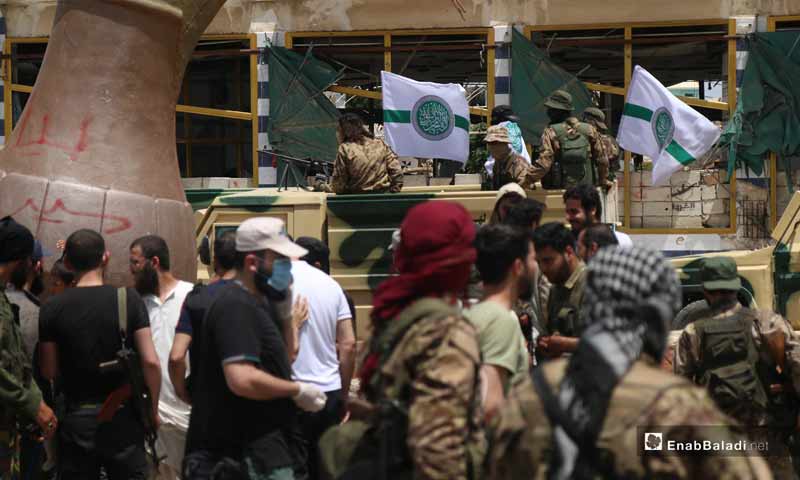Enab Baladi – Khawla Hefzy
In a recent report on international religious freedoms, the United States of America (U.S.) has designated Hayat Tahrir al-Sham (HTS) as an entity of “Particular Concern,” which brought the HTS back to square one. Thus, the HTS has been placed under “the guillotine of international classifications,” even though it has taken steps described as an “attempt to escape forward” or “circumvent” these classifications.
On 7 December, U.S. Secretary of State Mike Pompeo said that the new classification is part of his country’s efforts to “end religiously motivated abuses and persecution across the world.”
However, the HTS rejected the US’s new classification, adhering to a previous stance issued in mid-November; the HTS demanded a review of who is the “real killer” and who practices “all types of genocide with various internationally banned weapons,” referring to the Syrian regime, the communication director at the HTS, Taqi al-Din Omar told Enab Baladi in an email.
“Failed” attempts
Washington designated the Nusra Front, al-Qaeda’s Syrian branch, as a Foreign Terrorist Organization or FTO in December 2012. Various countries agreed on that, including Turkey.
Although the Nusra Front announced its disengagement from al-Qaeda and restyled itself the Fatah al-Sham Front, the U.S. Special Envoy for Syria, Michael Ratney, confirmed on 12 March 2016, that “Fatah al-Sham Front” is a terrorist entity.”
Again, the faction did not succeed in escaping from the classification, after changing the name to Hayat Tahrir al-Sham (HTS), as Washington insisted, on 15 May 2017, to place it on the terrorist lists.
The Nusra Front has made several efforts to “modify its behavior and organizational structure, and develop its ideology to match the role it wants to reach, including “alienating foreign fighters from its ranks.”However, the U.S. has not dropped the Nusra Front from its terror list, the researcher in jihadist Islamic groups, Abdul Rahman al-Hajj.
Al-Hajj believes that it is “natural for the HTS to be the subject of the U.S. administration’s suspicions and concerns,” because “the Nusra Front” is the main component of “the HTS.”
“Carrot and stick” policy
Abbas Sharifa, a researcher in jihadist Islamic groups, believes that taking the HTS off the US’s blacklist was like dangling “a carrot” in front of the HTS in order to “control its tracks ”and push it towards a functional role. This role basically includes fighting the most extremist organizations, such as the Guardians of Religion Organization, and implementing international agreements regarding the understandings about northwestern Syria and the disassembly of the Free Syrian Army’s factions.
The HTS carried out arrests of members of the Guardians of Religion Organization, al-Qaeda branch in Syria, last June, including military leaders and leading jurists in the HTS, including Abu Yahya al-Jazairi and Abu Abdul Rahman al-Makki, Taqi al-Din Omar told Enab Baladi.
The arrest of the former leader of the HTS and the leader of Guardians of Religion Organization, “Abu Omar Minhaj,” on 28 June, was preceded by clashes between the HTS and “Fesbutu” operations room, which includes “jihadist” factions, most notably the Guardians of Religion Organization between 23 and 26 of last June, in the village of Arab Saeed.
Sharifa believes that “when the HTS completed the mission,” the carrot was permanently withdrawn from it, and the HTS remained on the terrorist lists.
On 4 September, the French-speaking Swiss newspaper Le Temps quoted an interview with Abd al-Rahim Atoun, the HTS general jurist (leading cleric), aka Abu Abdullah al-Shami, in which he talked about “normalizing relations with Western countries.”
Le Temps quoted Atoun as saying, “We are the last to be fighting the regime and its allies; however, we will not be able to eliminate it without assistance,” referring to his request for help from countries to bring down the regime, as the HTS and the region cannot continue without the help of Western countries.
He said, “the HTS was the last faction to fight the Syrian regime and its allies; however, it cannot eliminate it without help,” referring to his need for help from western countries to end the al-Assad regime’s existence in Syria.
He stressed that his faction wants to ” be removed from the blacklist […] and only then will the region be able to recover,” according to Atoun.
Atoun denied parts of the discussion after about ten days, yet, he considered removing the classification “positive.”
What happens after the new classification?
Washington constantly insists on designating the HTS as a “terrorist group,” regardless of its name and who merges with it. This raises questions about the upcoming steps, especially since the raids attributed to the Washington-led coalition in northwestern Syria were far from targeting the HTS leaders.” The coalition’s airstrikes targeted only the Guardians of Religion Organization leader, the al-Qaeda branch in Syria.
Abbas Sharifa, the researcher on jihadist groups affairs, excludes the international coalition’s treatment of the HTS differently after the new classification.
He told Enab Baladi that the military operations carried out by the international coalition are linked to the extent of the threat posed by the HTS to its interests, and “up to now it does not pose any danger to the outside.”
That said, Sharifa argues that “ The HTS will not grant political legitimacy, and all its military and administrative achievements will remain without political return.”
On the other hand, Abdul Rahman al-Hajj thinks that the US stance can be understood as an increased pressure to bring out the deeper transformation.”
He believes that it is clear that “American pressure on the Nusra Front comes after a series of transformations, and will likely lead to more.”
According to al-Hajj, the transformations include that the HTS will have to end the phenomenon of foreign fighters in its ranks, confront the Guardians of Religion Organization, and establish a greater change in its cross-border ideology to be closer to the national organizations.”











